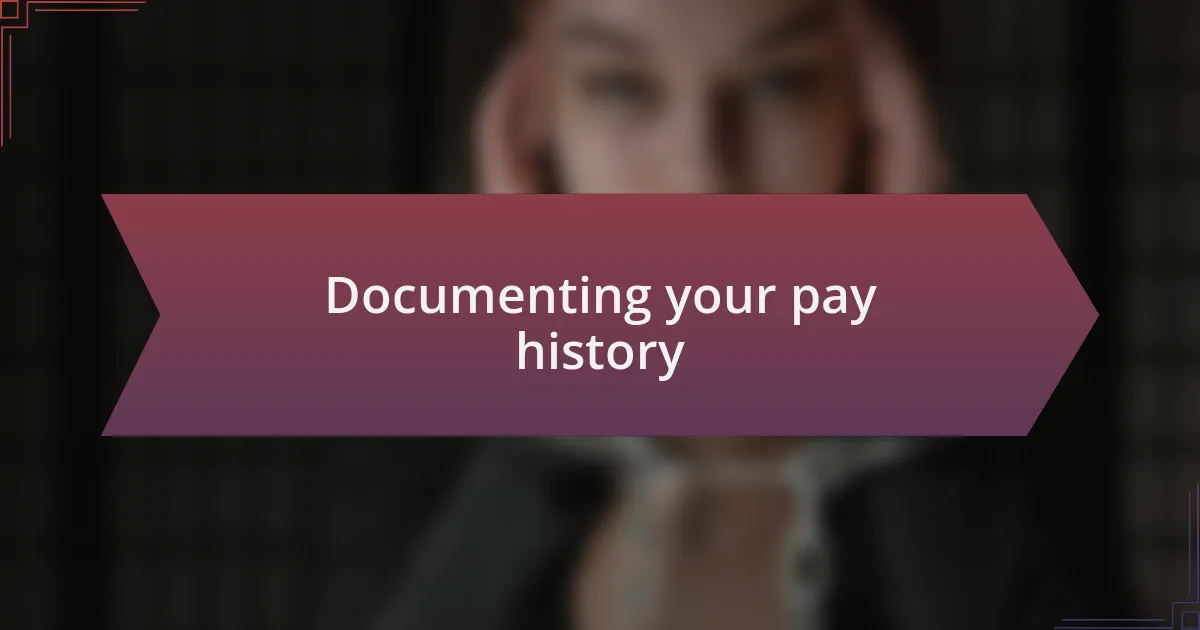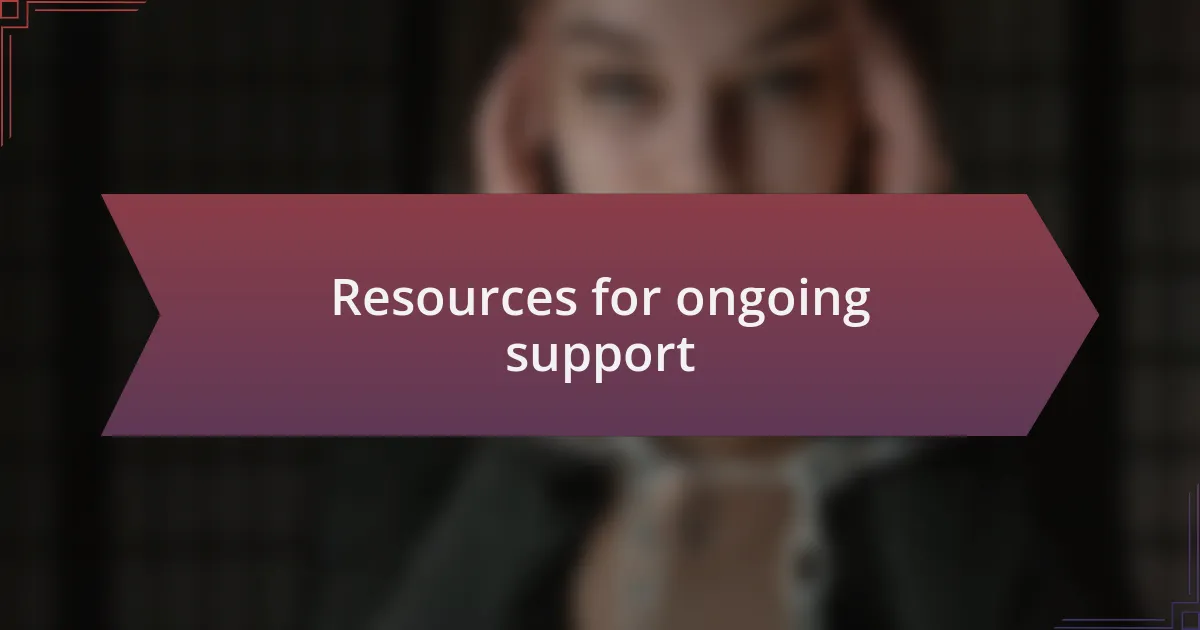Key takeaways:
- Equal pay laws, such as the Equal Pay Act of 1963, aim to eliminate wage disparities based on gender and promote transparency in compensation discussions.
- Gathering evidence of salary discrepancies and having open conversations with employers are crucial steps in raising pay concerns effectively.
- Documenting pay history and performance can strengthen your case when discussing compensation with employers.
- Engaging with advocacy groups and utilizing online resources fosters community support and empowers individuals to address pay equity issues.

Understanding equal pay laws
Equal pay laws are designed to eliminate wage disparities between employees who perform the same work, regardless of their gender or other protected categories. I remember when I first learned about the concept of equal pay; it struck me as both empowering and necessary. It made me question: how could such disparities persist in a society that prides itself on fairness and equality?
Understanding these laws begins with recognizing their legal framework. The Equal Pay Act of 1963, for instance, prohibits discrimination on the basis of sex in terms of wages, ensuring that men and women receive equal pay for equal work. I’ve often encountered colleagues who felt discouraged by their paychecks, wondering why they were earning less than their counterparts for doing similar tasks. This realization can evoke a profound sense of injustice, prompting many to take action.
The laws also underscore the importance of transparency in salaries and job titles within organizations. I once worked in a company where discussing pay rates was frowned upon, and it stifled open conversations about equity. It led me to consider how much more equitable workplaces could be if employees felt empowered to share their experiences without fear. The key takeaway is that understanding equal pay laws is essential not just for fair compensation but for fostering a culture of trust and collaboration in any workplace.

Steps to raise pay concerns
When raising pay concerns, the first step is to gather concrete evidence. I remember a time when I noticed a discrepancy in my salary compared to a colleague in a similar role. I compiled data on our job descriptions, performance evaluations, and industry benchmarks. Having that information made me feel more confident when I decided to approach my manager with my concerns.
Next, I recommend having an open and honest conversation with your supervisor or HR department. When I scheduled my meeting, I prepared a clear outline of what I wanted to discuss, making sure to articulate my feelings and the data I had collected. It’s crucial to frame the conversation as a dialogue rather than an accusation, fostering a more productive environment for discussion. Have you considered how your tone can significantly influence the outcome of such discussions?
Lastly, be ready to explore various outcomes. In my case, my manager acknowledged the issue and agreed to review my compensation, which led to further discussions about pay equity within the team. Sometimes, it might even lead to institutional changes. Remember, raising pay concerns can be a pivotal moment, not just for you, but for your colleagues as well—could your actions inspire others to advocate for themselves?

Documenting your pay history
When I began examining my pay history, I realized how crucial it was to have thorough documentation. I started by creating a spreadsheet listing all my past salaries, bonuses, and any relevant pay adjustments. This was not just a numbers game; it became a way for me to see patterns and identify any unsettling inconsistencies that could keep me awake at night.
Looking back, I remember the mixed emotions I felt as I compiled my pay history. On one hand, I felt empowered by the clarity it provided; on the other, it was disheartening to see how my compensation had lagged behind that of peers performing similar work. Have you ever taken a deep dive into your own salary records? The realization can be both eye-opening and motivating.
I also made sure to note down details of any performance reviews, promotions, or changes in responsibilities that might have impacted my pay. This holistic view allowed me to make a stronger case when discussing compensation with my employer. I found that having this comprehensive history not only bolstered my confidence but also made it easier to navigate those potentially awkward conversations about pay.

Approaching your employer about pay
When you decide to approach your employer about pay, timing is everything. I found success by choosing a moment when my manager was not overwhelmed with other tasks. Walking into that conversation feeling calm and prepared made all the difference. Have you ever noticed how the atmosphere can change the outcome of a discussion?
I remember the day I sat down with my supervisor. I communicated my findings confidently but also with empathy, understanding that this was a sensitive topic for both of us. It’s essential to frame the conversation around mutual benefit, rather than just what you think you deserve. Focusing on how fair compensation can lead to better work outcomes for the team can help in garnering support for your request.
After stating my case, I made sure to invite open dialogue, allowing my employer to share their perspective. This not only helped me gauge their reactions but also fostered a sense of collaboration. Engaging in a two-way conversation often opens doors to negotiations. Have you ever thought about how asking the right questions can shift the dynamic of a discussion? It certainly did for me.

Sharing personal advocacy experiences
When I began advocating for equal pay, it felt like stepping into an uncharted territory. I vividly recall attending a company meeting where someone casually mentioned their salary, and it sparked a realization about the discrepancies in our pay scales. Have you ever felt that wave of determination wash over you when injustice hits close to home? That moment solidified my resolve to address the issue head-on, both for myself and for my colleagues who might not have the same voice.
Later, I took the initiative to organize a small roundtable discussion with fellow employees. Sharing our stories not only highlighted the common struggles we faced but also strengthened our collective stance. It was illuminating to hear others voice their frustrations; did I ever think that my experience could inspire others to speak their truth? Yes, I did, and that realization prompted me to lead the charge toward change.
One particularly impactful discussion took place over coffee, where a co-worker expressed how she felt undervalued despite her contributions. Listening to her made me reflect on my own experiences and reignited my passion for advocating for pay equity. That exchange served as a powerful reminder that advocacy isn’t just about numbers; it’s about the stories and emotions behind them. Have you ever wondered how sharing your personal journey can create a ripple effect of empowerment? I learned that our voices, when united, become a formidable force for change.

Resources for ongoing support
Accessing resources for ongoing support can be a game changer in your advocacy journey. I remember discovering the Equal Pay Coalition’s website, which offered valuable toolkits and resources that guided me in understanding my rights. Have you ever felt overwhelmed by the thought of tackling such a big issue alone? Finding these resources helped me realize I wasn’t in it by myself; I had a whole network supporting my fight.
Connecting with local advocacy groups can also provide encouragement and information tailored to your specific situation. One evening, I attended a workshop hosted by an organization focused on equity in the workplace, and it was inspiring to see so many passionate individuals coming together. The shared laughter, tears, and determination in the room made me think: what if everyone had access to such empowering spaces? I found it invaluable to learn that there are people out there who fuel your fire and share similar aspirations.
Don’t underestimate the power of social media as a resource for building connections and finding support. I started following pages dedicated to equal pay advocacy, and the community I found was extraordinary. Seeing real-time posts about victories and challenges from others in the same boat made me think—how can we amplify our voices together? Social platforms can serve as rallying points, helping you find allies and stay informed about ongoing campaigns.